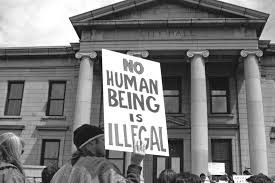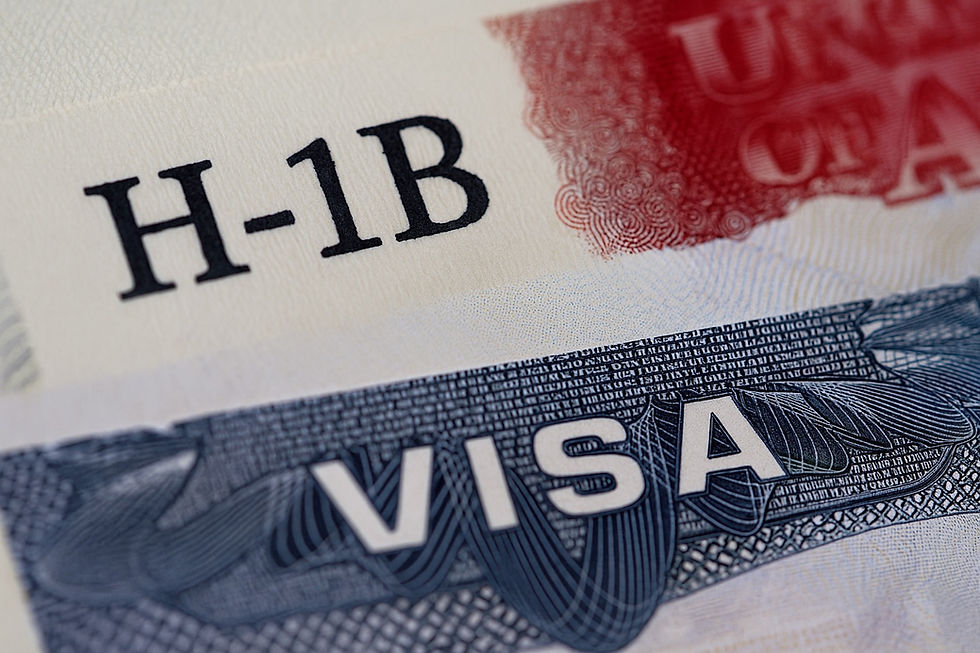How new H-1B Fee Rules Favor the Wealthy and Why the Current Enforcement Policy Will Destroy our Economy and Social Security
- Chapman & Roberts, P.A.

- Nov 12, 2025
- 6 min read
These two topics reflect perhaps the most visible steps that this administration has taken in restricting immigration, without giving much if any thought to how those policies will cause massive damage to the economy. That damage will drive away highly skilled workers who want to work in the US, as well as manually skilled workers who fill essential jobs in multiple industries.
The following comments show how the administration is trying to make the H-1B system available only for the uber wealthy, and how its enforcement only strategy is likely to decimate the economy in general and Social Security in particular.
The New H-1B Fee Rules
Two rules have been introduced in the H-1B field. The first is now applicable, and it requires a portion of the H-1B cases filed by businesses to pay a new $100,000 fee whenever the sponsoring company files a new H-1B case. There are a number of exceptions to the rule, and the actual scope is being hashed out in practice and in court now.
The Executive Order that introduced the new rule claims that petitioning companies are using the H-1B system to replace US workers with lower paid, lower skilled workers, but uses suspect data to support the EO.
The $100,000 filing fee (in reality a fine) is based on flawed data described in the EO – that salaries paid to H-1B workers showed a 36% discount for H-1B entry level workers as compared to full-time, traditional workers. The study cited in the EO arrived at that conclusion by comparing wages for workers with little or no labor-market experience to wages for people who have worked for many years in the same occupation, a true “apples and oranges comparison” or, as Forbes put it, “a comparison economists consider invalid.” (Forbes 2025)
The EO also cited data that unemployment rates among computer occupations increased from 1.98 percent in 2019 to 3.02 percent in 2025, hardly an alarming trend. The EO went on to describe 2001 statistics showing that, a quarter of a century ago, wages for American computer scientists would have been as much as 5% higher, and employment for these American workers would have been between 6 and 10 percent higher, “absent the importation of foreign workers into the computer science field.” The EO failed to explain how wage and employment rates some 25 years ago are relevant to today’s economy or government policies.
In fact, the EO’s claims are false. Multiple economic studies confirm that H-1B workers are not paid depressed wages, and actually earn more than comparable US workers in the same industries. (Forbes 2025)
In reality, the goal of the EO is to price virtually all petitioning companies out of the system, so that the US imports only a fraction of the H-1B workers that are allowed under the 65,000 per year cap established by Congress. Even if we do have a 3.02 percent unemployment rate for US born computer scientists, the solution is not to destroy the H-1B system, and that is precisely what the $100,000 fee will do, except for petitioners who have unlimited funding.
Noticeably absent from the data cited in the EO is data related to non-computer industries such as teaching, accounting and health care. Nor does it take into account the need of non-profits to use the H-1B system. (Non-profits are not exempt from the new fee.) Many private K-12 schools use the system to hire teachers who have language and other skills that are critical to the education of their students. This rule will force virtually all of the non-profits to stop filing for new H-1B teachers.
The other H-1B rule will give another massive advantage to wealthy employers. Under the current system, an employer must pay the H-1B worker at least the prevailing wage, an amount calculated through the DOL data based. Under the current system, when the employer files the case, it researches DOL data and determines if the job should require one of 4 different wage levels (Level 1 is for entry level workers , Level 2 is for “qualified”, Level 3 is for “experienced” and Level 4 is for “senior level jobs requiring high judgment and independence”). Every March, employers enter a lottery and hope to be chosen so that they can file a petition with USCIS for one of the 65,000 numbers for that fiscal year.
The lottery is where the new rule creates an arbitrary advantage to the wealthy: the higher the salary, the higher the chance of being picked. The new rule provides that, if the employer agrees to pay a Level 4 wage, the employer is entered into the lottery 4 times; if it pledges a Level 3 wage, it is entered 3 times; and so on.
The purported justification for this rule is to ensure that H-1B workers are only the best and the brightest. That claim falls short of reality: the current DOL system looks at education, job duties, areas of responsibility, etc., to determine what jobs and workers carry a Level 1, 2, 3 or 4 wage. The new rule turns that system on its head and in essence says that, just because employer agrees to pay a Level 4 wage, the employee must have Level 4 skills, education and experience. That claim is absurd. A much more likely scenario is for the employer to be filing the case for a friend or business colleague’s request for a favor to bring in a relative or a family member of another person to whom the business colleague owes a favor. Or, the petitioner could be reacting to a threat, economic or otherwise, against it, and could agree to file the case to avoid the threatened harm.
In short, this new rule creates an incentive to sponsor the least qualified workers, as opposed to the best and the brightest. Although our economy can absorb a small number of unqualified workers, this new selection strategy will substitute wealth in place of the current merit selection process to undergird the H-1B immigration category.
As the crass joke goes: The Golden Rule is that the people with the gold make the rules. With these two H-1B fees, that is exactly what is happening.
Current Enforcement Only is a Recipe for Disaster
Candidate Trump promised that if he were re-elected, ICE would only go after the “worst of the worst”. Once in office, that promise disappeared, and Steven Miller announced a 3000 per day arrest goal for ICE. He and Secretary Noem have adopted an enforcement only policy, even while claiming that they only target immigrants with bad criminal records, and/or prior removal orders. Not so: the vast majority of people arrested since January 20 have been undocumented immigrants with no criminal record (or at least only a very minor record) and no removal order. Estimates are that so far we have deported about 1 million people.
What will the result of this be? The undocumented population has tremendous buying power, and if all 15-20 million undocumented people are deported, the economy will take a massive hit. This administration’s enforcement only policy will ravage all industries that are supported by these essential workers (construction, fruit industry, hospitality, dairy and the farm industry in general), and no US workers are going to replace them all. A US citizens who loses a job in Maine will not travel to California to pick fruits and vegetables for minimum wage, or to Georgia to work in a non-agricultural job. To believe otherwise is to believe in fairy tales.
Social Security also will head to insolvency that much sooner under this policy. Among the undocumented population, working age immigrants are by and large young and actively employed people. Usually, although not always, they are paid through payrolls as opposed to cash, and their employers take out withholdings and Social Security taxes. In addition, undocumented workers cannot collect Social Security.
Like Japan, our birth rate is less than what we need to sustain our population and our Social Security system. If we want Social Security to continue to be solvent, we need to preserve, not deport, that section of the working class.
Summary
This administration claims that it sets business friendly policies that will strengthen the economy and encourage entrepreneurs to come here. It does not. Having a punitive H-1B system that is dominated by uber wealthy companies who are encouraged to bring in anyone they want is anti-merit and will drive away the bright minds who have made our economy what it is.
The administration also claims that that it wants prices at the grocery store to go down and for Americans to have a secure future. Not so: its policies will cause food prices to increase exponentially; they also will expel a major percentage of our working population who support our economy and contribute to Social Security.
Gerry Chapman ©
Board Certified Immigration Law Specialist
November 12, 2025



